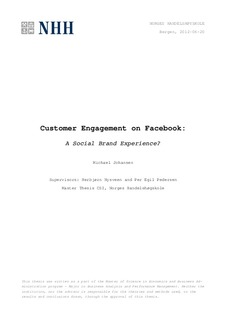| dc.description.abstract | Service-dominant logic has become a central perspective on marketing and comes along with several other trends that have evolved over the past decades. In this paradigm it has been shown that strong brand experience leads to several positive consequences such as loyalty and satisfaction, brands should therefore consider how they create experiences for their customers and users. Lately it is the influence of The Internet and Social Media that has been central in development of the relatively new customer engagement perspective on brands which is under development by leading academics.
I have combined these perspectives with data from Facebook to measure their effects on actual behaviour with a non-anonymous survey conducted directly on Facebook in a custom built application. I also included an experimental friendliness dimension in this survey to help the search for the effect of being “on Facebook”.
The results showed that brand experience on Facebook is better explained by an experience measure that excludes the physical dimensions, sensory and physical, and rather include the relational and friendliness dimension, together with the intellectual and affective dimensions into something that I would like to call the Social Brand Experience. I show how this explains both customer engagement and actual user activity. The linking between actual Facebook activities and customer engagement, customer engagement leads to a higher level of user activity. The role of network activity on Facebook is explored and shown to have significant effects on both experience and engagement.
There is also evidence for a feedback loop through customer engagement explained by variations in the dimensions of Social Brand Experience and network activities on Facebook. | no_NO |
